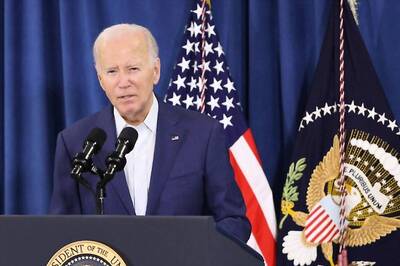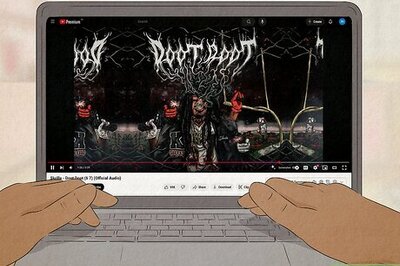
views
New Delhi: A verbal duel was witnessed between India and Pakistan at Maldives Parliament on Sunday over the issue of Kashmir and terrorism.
"Pakistan is not the purveyor of terror but the victim. Most people lose their lives in Pakistan because of terrorism. You cannot allow them to say this," Pakistani senator Qurat ul Ain Marri said in a raised voice when Deputy Chairman of Rajya Sabha Harivansh Narayan Singh was speaking on Pakistan-occupied Kashmir.
A country which indulges in the genocide of its own individuals have no moral right to raise the issue of Kashmir, Singh added.
Heated exchange of words between the respective speakers of parliament from #India and #Pakistan over the #Kashmir issue | Part 2 | @Raajje_tv pic.twitter.com/o9OV0VAElI— raajje.mv (@raajjemv) September 1, 2019
Before the argument between Singh and Marri, Pakistan delegate Qasim Suri also tried to raise the issue of Kashmir before the house. "We cannot ignore the oppression of Kashmiris," he said, drawing sharp reaction from India.
"We strongly object to raising of the internal matter of India in this forum. We also reject the politicisation of the forum by raising issues which are extraneous to the theme of the summit," the Deputy Chairman of Rajya Sabha said.
Heated exchange of words between the respective speakers of parliament from #India and #Pakistan over the #Kashmir issue | Part 1 | @Raajje_tv pic.twitter.com/HhSq0ubceP— raajje.mv (@raajjemv) September 1, 2019
Raising a point of order again, the Rajya Sabha Deputy Chairman retorted: "Excellency, I would like to ask what moral rights this country has to raise issues related to human rights? The world knows how they committed genocide in a part of their own country and that country is now separate entity called Bangladesh.
"Since they have raised human rights issue of Kashmir, I would like to state facts that Pakistan has occupied our part of Kashmir known as Pakistan-occupied Kashmir. "This Pakistan-occupied Kashmir comprises 2 areas, the so-called Azad Jammu & Kashmir (AJK) and Gilgit Baltistan (GB) which Pakistan has illegally occupied through armed action in 1947.
"Pakistan has kept people of this region guessing on their status. As a constitutional entity, the so-called 'AJK' is unique. It has been given the trappings of a country with a President, a Prime Minister and a Legislature of its own. But the so-called AJK is neither a country nor a province," he said, as Marri was on her feet again protesting India's remarks.
The Karachi Agreement (April 28, 1949) truncated POJK and brought more than 85 per cent of the land, strategically important for its connectivity with China and control of rivers, under Pakistan's direct control, Harivansh said.
From the time of the Karachi Agreement, the so-called AJK President and Prime Minister have enjoyed only titular power, that too at the pleasure of the Ministry of Kashmir Affairs, he said. Amid the commotion, Speaker Nasheed tried to calm down the two sides, as the Pakistani representative continued her fulminations.
The Indian delegation in the summit is led by Lok Sabha Speaker Om Birla. Tensions between India and Pakistan spiked after India abrogated provisions of Article 370 of the Constitution to revoke Jammu and Kashmir's special status and bifurcated it into two Union Territories.
Pakistan has been trying to raise the issue at various international fora, but India has maintained that it is an internal matter.




















Comments
0 comment